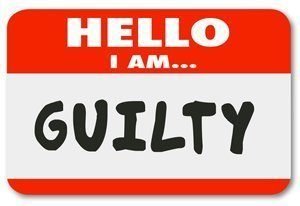And as a parent you likely will have discovered by now that people feel no shyness about commenting critically about your child’s behaviour and the way you are dealing with your child. It is hard to read the parenting literature or the newspaper’s reports on the latest release in research or the latest parenting advice (and possibly the editorials on this website), without experiencing confusion, alarm, and guilt.
Guilt hits to the core – you feel bad and would prefer to have it go away. It is such an uncomfortable feeling. And since our North American culture seems preoccupied with feeling good all the time, you can get into a real bind of feeling guilty about feeling guilty. What is the deal here?
Feelings, and under them the emotions deep in our brain, are the sources of our actions, and ‘bad’ feelings are as legitimate as ‘good’ ones. You could say, paradoxically, that having feelings is the very thing one should not feel guilty about!
Guilt in a child is a growth milestone, signifying a child’s sense of agency: that is, that he or she actually has an impact. From this grows a healthy sense of responsibility for their actions…
(However, making a child responsible for events over which they have no control can backfire, creating either pervasive neurotic guilt or a hardening against these feelings. If you have a child who feels responsible for their parent’s or teachers’ reactions to them, you have the source of a guilt that should not be in a child’s realm. In that same vein, recognizing the burgeoning feelings of guilt in a child should make one especially sensitive to making sure you are not using it to control the child’s behaviour. This also seems to happen in some schooling programs where there is an earnest attempt to built awareness of impact and inculcate a sense of responsibility,)
Ah see what I mean? Your impact on the child! There is no escape from guilt!
 And as Dr. Neufeld says in his parenting DVDs, it is better to keep this uncomfortable feeling in sight. There are many temptations in wanting to avoid this feeling. There is the impulse to shift responsibility to someone or something else, the hunt for validation by others, the drive to be a perfect parent. One of the ways that this can manifest is to try to make an immature child who is having trouble handling his feelings take responsibility for his/her behaviour, when he or she is clearly not in control. And there are things in yours and your child’s world that are not of your making, that you are not responsible for. Taking up a relationship with guilt will help you stay connected to your own feelings and intuitions.
And as Dr. Neufeld says in his parenting DVDs, it is better to keep this uncomfortable feeling in sight. There are many temptations in wanting to avoid this feeling. There is the impulse to shift responsibility to someone or something else, the hunt for validation by others, the drive to be a perfect parent. One of the ways that this can manifest is to try to make an immature child who is having trouble handling his feelings take responsibility for his/her behaviour, when he or she is clearly not in control. And there are things in yours and your child’s world that are not of your making, that you are not responsible for. Taking up a relationship with guilt will help you stay connected to your own feelings and intuitions.
Realizing how important you are to this developing being means that guilt will be part of the parenting equation, just like not getting enough sleep.
